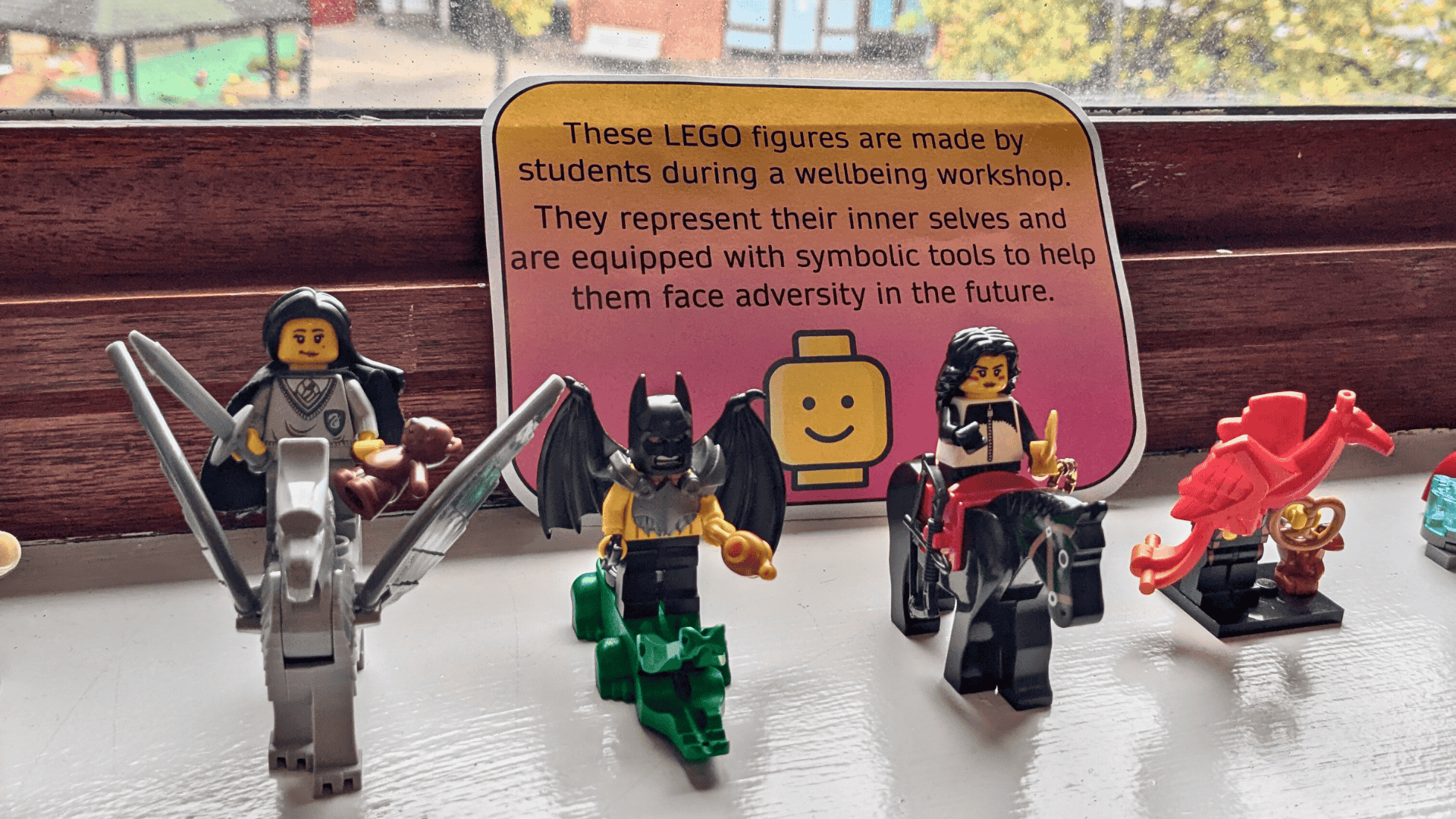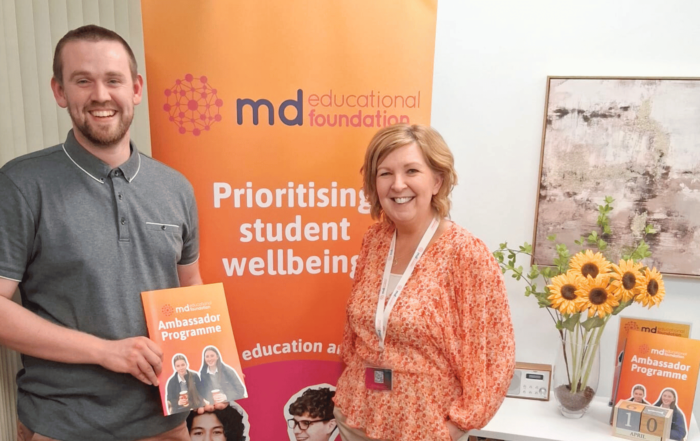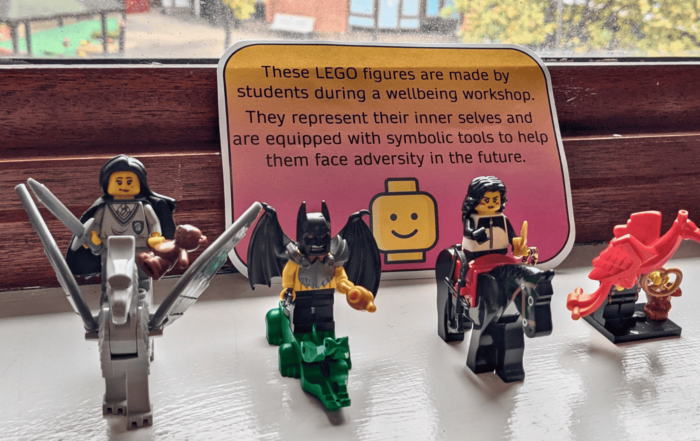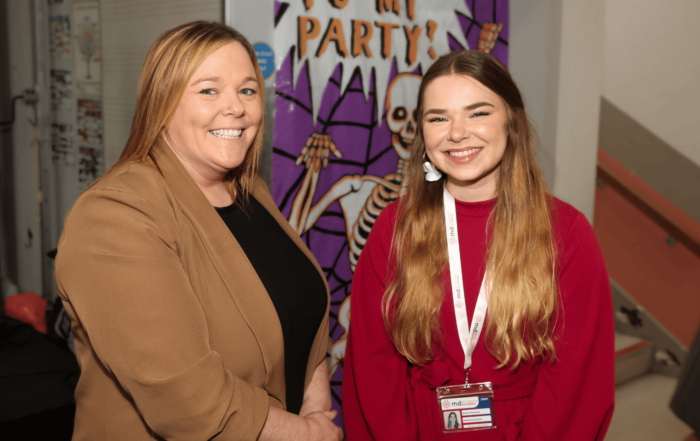Wellbeing workshops are a great way to promote positive wellbeing, encourage young people to look after their mental health and remove the stigma around mental health and wellbeing. In schools, workshops can provide many advantages when it comes to improving student wellbeing, such as supporting students with exam stress and improving student attendance.
Students can gain practical and valuable skills by participating in mental health and wellbeing workshops. The gained knowledge and resources can help young people navigate any challenges they might face throughout their lives and help them prevent situations that could negatively impact their overall wellbeing. Students can also feel more empowered to take an active role in looking after their wellbeing and help them navigate through education and beyond.
Some of our wonderful Wellbeing Leads have shared practical and useful intervention ideas that schools can implement to enhance student wellbeing and mental health. Our charity’s Wellbeing Leads across the UK and Ireland have hosted these sessions for their post-16 students in their schools’ Wellbeing Hubs. Each wellbeing workshop is student-centred, focusing on and covering the needs of students. Here are six wellbeing workshop ideas to help young people recognise, understand and manage their emotions:
- Foster self-esteem through self-expression
- Reduce stress and learn practical life skills with sewing
- Build resilience by being kind to yourself
- Reflect on hopes, dreams and aspirations for the future through vision boards
- Calm down and relax with mindfulness practices
- Remember to love yourself with confidence through self-care activities
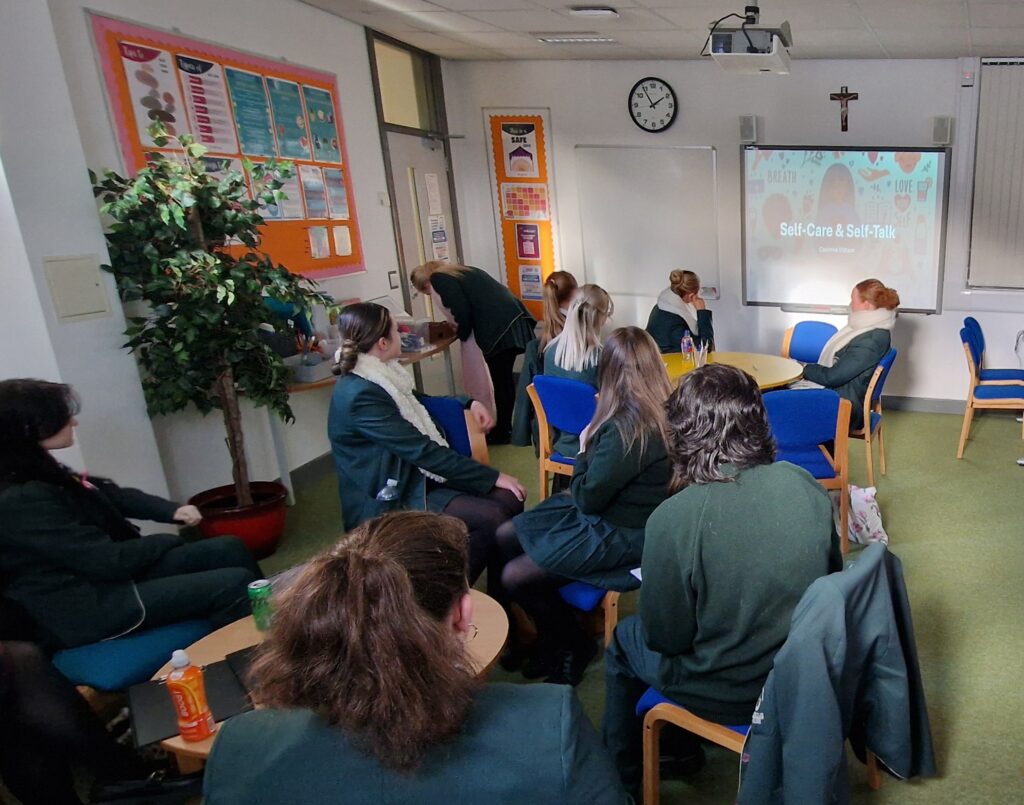
Self-expression workshop to help young people learn about themselves
This wellbeing workshop follows the Creative Expressive Structure outlined by Dramatherapy and Play Therapy pioneer, Sue Jennings. The school’s Wellbeing Lead first came up with the idea behind this workshop from their love of (and minor obsession) with LEGO minifigures alongside completing their undergraduate course “Creative Expressive Therapies” at the University of Derby. The course is now known as “Creative Expressive Arts, Health, & Wellbeing BA (Hons)”. The workshop has proven to be a success with children in Key Stage 2, adolescents with additional needs, sixth form students and adults too – it’s great for everyone!
“The idea is that you search through the different minifigure parts to create your ‘inner self’. It can look as similar to you, or as wildly different as you like – just so long as each piece represents something about you. Once you’re happy with how it looks you can choose a companion animal, some accessories, or maybe a boat or platform to stand on. Anything that further adds to the representation of You.
In a recent workshop, our students were encouraged to equip their minifigures with the tools they use to manage their wellbeing. This led to all kinds of results, from weapons that fend off negativity, to symbols of ways to distract and relax. Once everyone has completed their minifigure, they’re invited to share their creation and what each part represents with the group. There’s never any pressure or expectation to share, but for those that choose to, the focus is on listening and learning about them, as they are, not about asking questions and trying to analyse what they’ve put together.
This workshop tackles various aspects of wellbeing, including factors that typically affect mental health. Firstly, there’s plenty of creativity involved which fosters a growth mindset. You can’t fail at getting creative, so it’s always a safe bet to start with something that sparks the imagination. The usual hindrance to creativity is judgement either from yourself or others, so we have a strict ‘no judgment’ rule in our Wellbeing Hub.
Secondly, LEGO is great for unlocking the inner child in us and getting us to play. Some may smirk at the importance of play as we grow up, but it’s actually fundamental to human development throughout our lives, allowing us to explore safely. Play doesn’t have to feature toys either, although they can sometimes help to break down people’s defences. Again, ensuring that judgment isn’t welcome matters here, including from yourself as much as others.
Thirdly, this workshop can be done with any number of people. Whether by yourself, as a one-to-one, or as a group. We like doing it as a group as it adds an amazing social aspect to it which deepens our learning and connections. Learning about others and sharing things about ourselves can bring us close together, help to tackle loneliness, and fight off mental health issues like anxiety and depression. We’re a lot more resilient when we have a team around us too.”
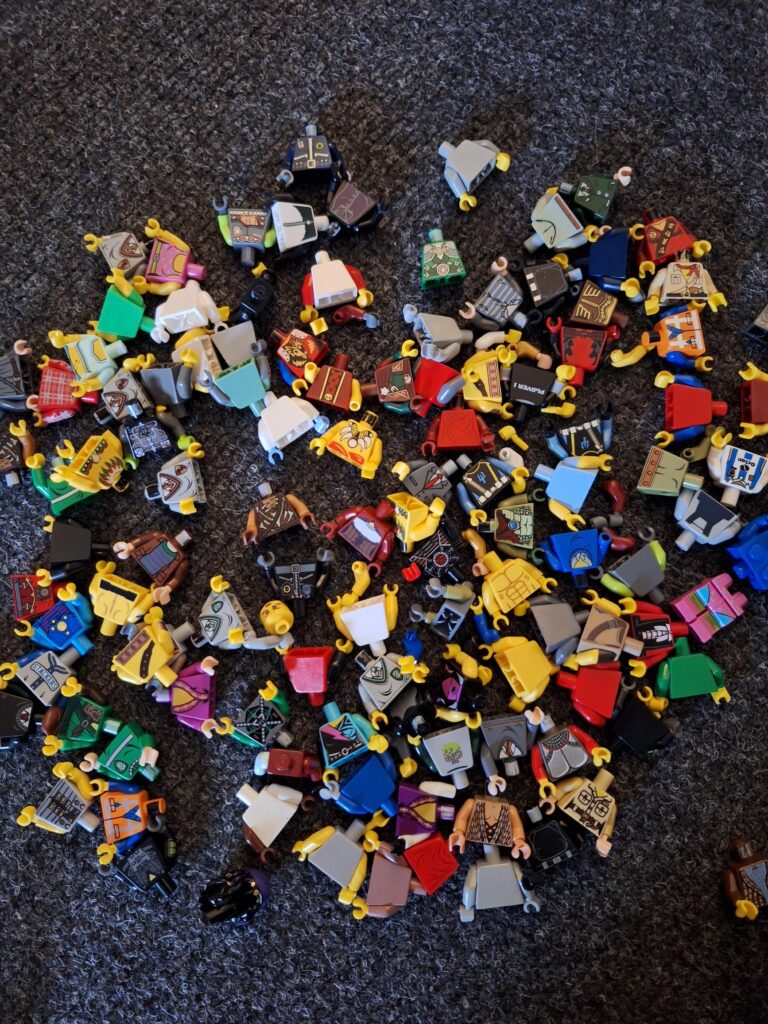
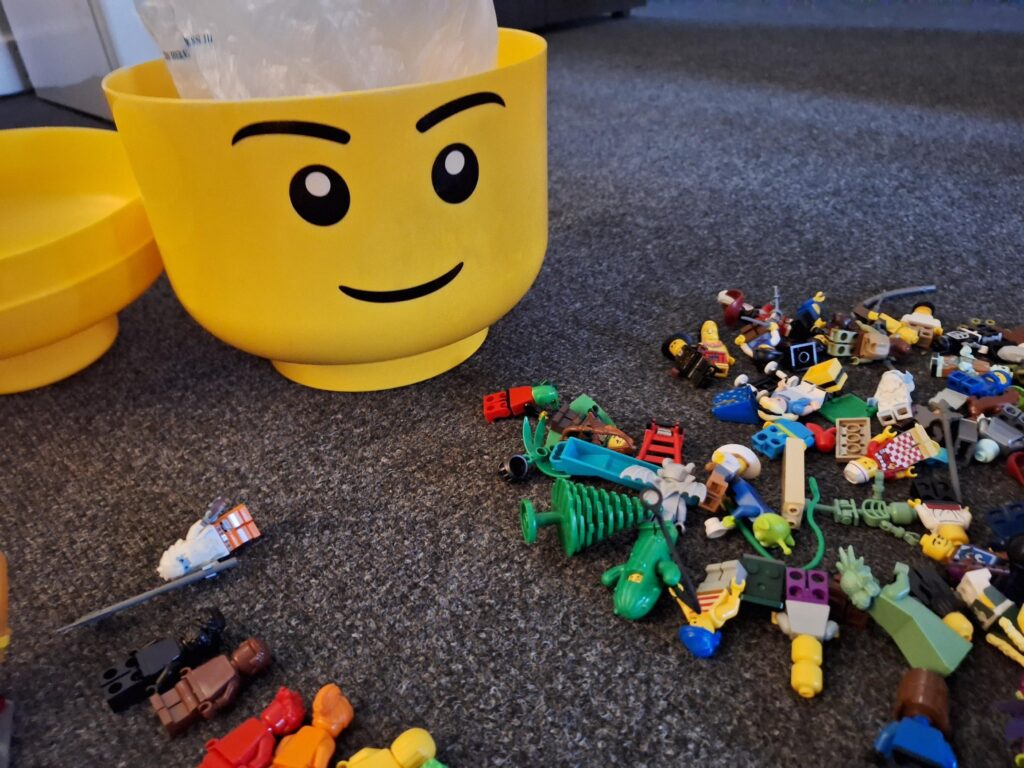
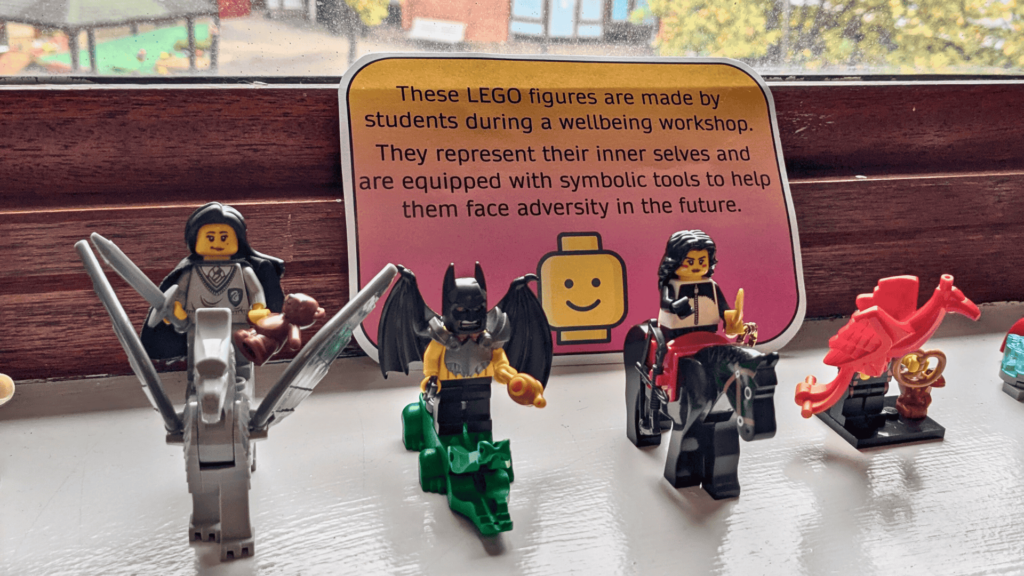
Sewing wellbeing workshop to bring in the calm and relaxation
“Mindfulness is a positive side effect of sewing. As well as the sustainability benefit, it can be very therapeutic. Sewing helps you to work on your concentration, as it’s a step-by-step process, you can pause anytime without the frustrating feeling of having failed completely. Sewing has actually been proven to have stress-reducing effects on the brain, promoting relaxation and calm. The rhythmic motion of the needle moving through fabric can be meditative and help release tension.
Twice a week at our school’s Wellbeing Hub, students come together in a sewing to work on things like threading a needle, hand stitching, and sewing on a button. As the weeks progress and confidence grows, we combine efforts to make a patchwork quilt.
Through this focused circle, we eliminate the ever-present digital devices and hopefully build the attention spans of everyone who joins. It can also help us to regulate emotions by offering a creative outlet for relieving stress, boosting mood and improving self-esteem
In conclusion, sewing is much more than just a practical craft; it’s a valuable life skill with a whole host of benefits. From fostering creativity and self-sufficiency to promoting mindfulness and social connection, sewing enriches lives in countless ways.”
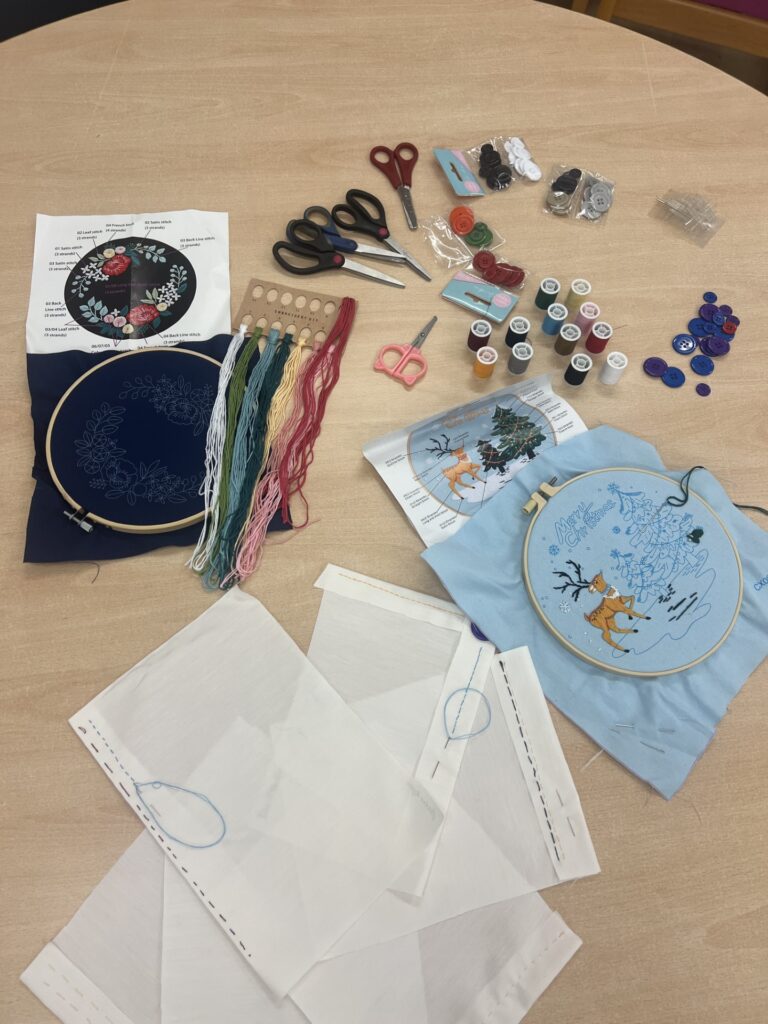
Mental health workshop to remind students to be kind to themselves
“Being kind to yourself when things are difficult, busy, or when we’re faced with change in our life is a crucial element of reinforcing and maintaining positive mental health. Even though we can forget to take care of our own wellbeing, exhibiting kindness towards ourselves first and foremost allows us to build resilience and create positive coping strategies. It’s essential to be kind to yourself.
Learning objectives of the wellbeing workshop include:
- Building resilience and kindness
- Reflecting on and learning ways of looking after your wellbeing and mental health
- Learning some coping skills
- Becoming aware of your own wellbeing and how you can help yourself
At our school, we start the workshop with a reflective exercise in our Wellbeing Hub. This allows students to break off into smaller groups to discuss the question of ‘what is wellbeing?’.
We talk about mental health and wellbeing a lot and we hear these words now more than we ever have. But what do they actually mean and what do they mean to us? These questions allow students to work together in smaller groups and contribute different ideas of what wellbeing means to them as well as reflect on the definition of wellbeing and how we factor and prioritise wellness into our everyday routines.
We then explore some of the ideas shared by students and discuss how wellbeing is divided into three different categories: emotional (how you feel), physical (your body and health) and psychological (your mind and thoughts). The students then give specific examples of how they factor wellness into their lives across these three areas. These might be as simple as going for a walk, listening to music, or socialising.
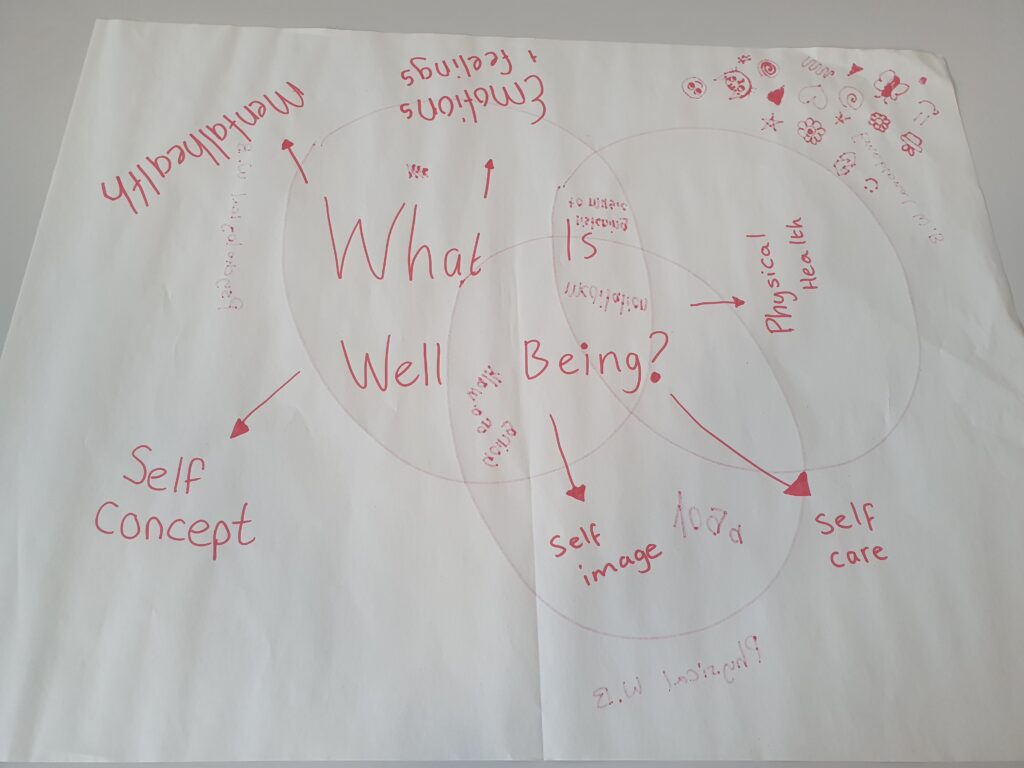
After talking about what wellbeing means to us as individuals, students draw a Venn diagram on a large page of flip chart paper, then they label one circle ‘Emotional Wellbeing’, one ‘Physical Wellbeing’ and one ‘Psychological Wellbeing’. They then write or draw (or both) the things in each circle that help them with these aspects of their wellbeing. If something falls into all three, they can include this in the intersection of the circles. For example, going for a walk with a friend would be part of emotional, physical, and psychological wellbeing.
Once they have finished, we explore whether they have access to do the things they’ve identified. We also discuss what could be added to their daily routine to further enhance and help them with their mental health and wellbeing every day.
We’ve found that students really enjoy working in smaller groups and exploring different things that allow them to be proactive with their wellbeing. They get to hear different ideas and suggestions from their peers and reinforce the fact that it’s okay to prioritise your wellbeing. Additionally, discussing wellbeing in smaller groups brings the topic to the forefront of their consciousness, which is particularly useful for students who find it difficult to think about things they do daily to maintain and be proactive with their own wellbeing.
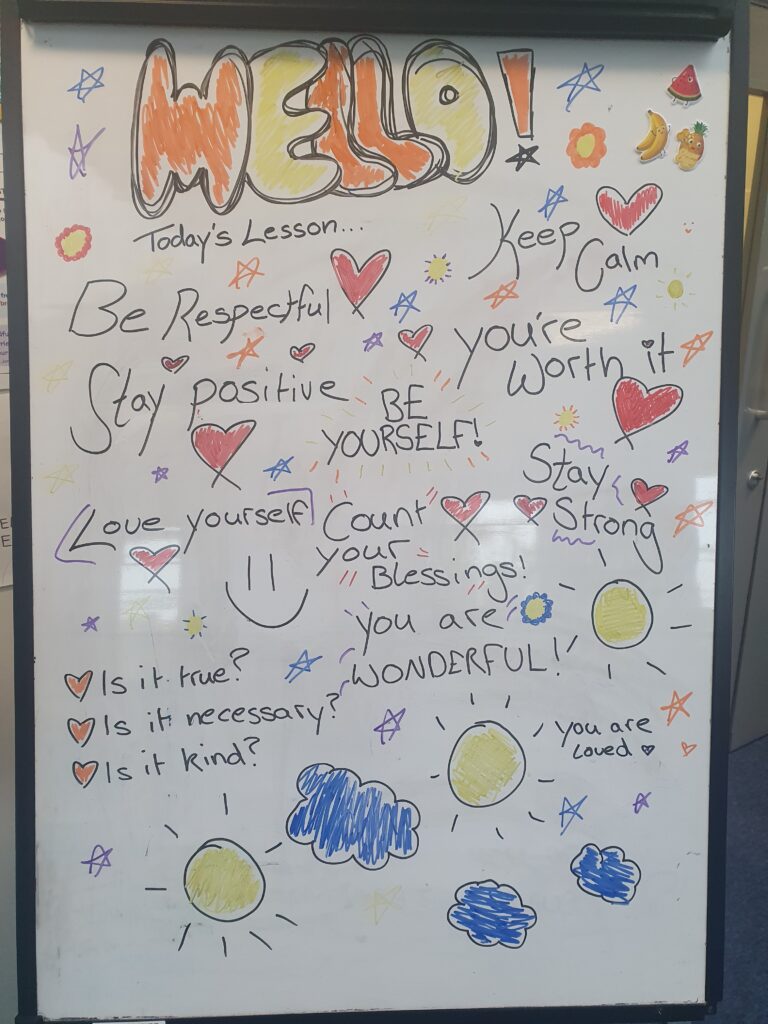
Students also see the benefit of this workshop as it gets them thinking about their own wellbeing and how the implementation of different things related to wellness can create a more positive mentality for them.
Students then do an individual exercise where I give them a piece of paper and a pen and ask them to write down the question ‘how do I feel today?’.
This is an important question and one we don’t ask ourselves enough. Even from a young age, we can be discouraged from acknowledging our emotions. We don’t allow ourselves to tap into our emotional mechanisms to really consider what we may be experiencing. This is important to allow ourselves the opportunity to check in with ourselves and tap into how we may be feeling to figure out how we can potentially better help ourselves.
Tracking how you feel over the course of a day can give you a good indication of the range of emotions you experience. You can refer to your tracker before you go to sleep to see what were the high and low points of your day.
What positive thing could you take from today and do again tomorrow? Think about the changes in the weather and your hormones that may affect your mood. Do you notice these things changing how you feel?
You can track your emotions the next day and every day of the week if you want to. Sometimes it’s hard to express how you feel. You can try drawing emojis or using a graph to highlight the times you feel your mood is at a lower point and colour coordinate different emotions such as anger, and mark this on the graph. The line at the bottom being the different times of the day and the line at the side could be how you feel, from the best you can feel at the top, to the worst you can feel at the bottom. This is important as it may just give you more insight and understanding of when and why your emotions and feelings change to better understand and support your own wellbeing. It will help you learn how you can become more in control of your emotions too.
Another part of this wellbeing workshop is a breathing activity, which allows us to stop and come into the present moment for a few minutes. It helps us become more aware of our breath and tap into our thoughts and how we feel in the moment. Breathing exercises are a fantastic way to clear our minds and reset. Visualisation is also an important part of this, and really helps to relax our bodies and minds.
Here’s the outline for a visualisation-focused breathing session should you wish to use this technique in your school. Set the scene by asking students to follow this process:
- Imagine you are sitting on a soft sandy beach
- You’re watching the waves come in and out of the shoreline. With each wave that comes in, you breathe in, with each wave that goes out, you breathe out
- Keep breathing along with the waves for a few minutes until you feel more relaxed and in tune with your mind and body
Try and stay focused with your visualisation, but don’t worry if your mind wanders, as this is very normal. You can use headphones and play the sounds of the ocean if it helps too.
It’s important to remember you can take control of your wellbeing.
The main thing is to act and remember that you can. You may not be able to solve all the worries and problems you have in your life, but you can always do something to help you feel better. Think about the different things you can do and resources you have access to , including who you can reach out to for help and support when things seem too overwhelming to manage. Think about how you can ask for help and focus on what you can do to help yourself and your wellbeing.”
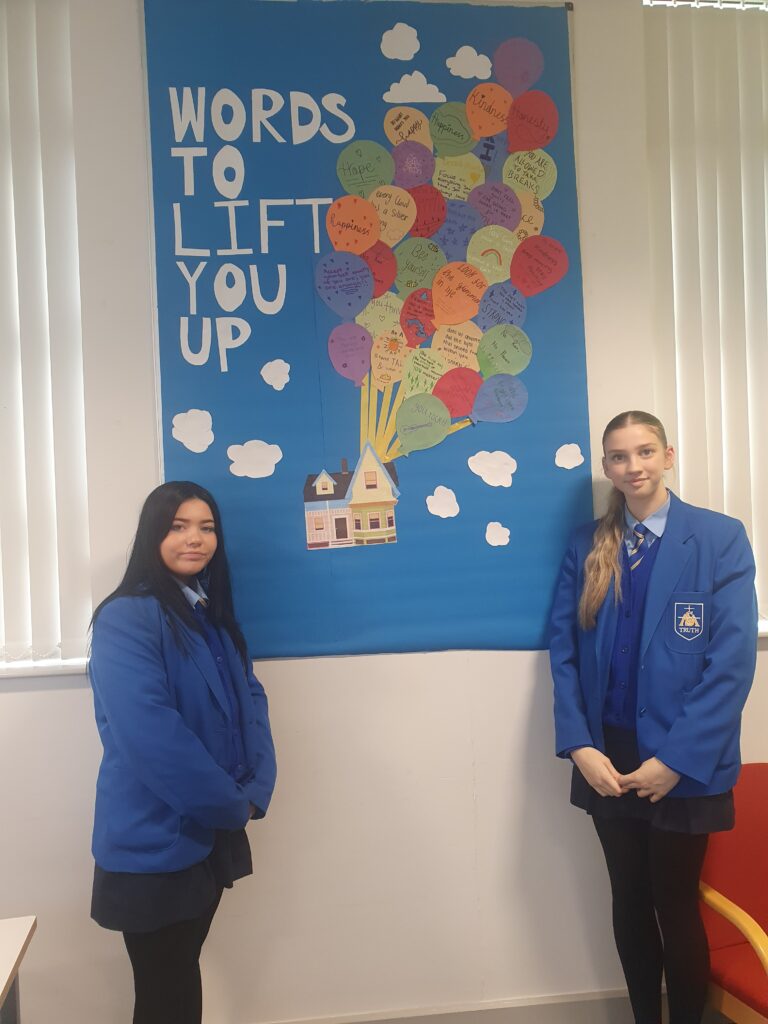
Vision board workshop to support young people build hope for the future
“The ‘Hopes for the Future: A Vision Board’ workshop is designed to offer a space for post-16 students within the Wellbeing Hubs to explore and reflect on their hopes, dreams, and aspirations for the future.
This interactive session encourages participants to creatively express their own identity, goals, and ambitions by curating a visual representation of their future hopes. By engaging in this process, young people will not only define their passions and what is important to them, but they’ll also set potentially meaningful short- and long-term goals for themselves.
During the workshop, the Wellbeing Lead can encourage young people to consider goals in terms of education, careers, relationships, and personal growth, incorporating all that they know of themselves already in terms of interests, passions and pursuits they enjoy.
The workshop embraces a sense of self, self-awareness, builds confidence, and empowers young people taking part to potentially take proactive steps toward their future, while also creating a supportive space for open discussion and reflection within the group.
Once the vision boards have been carefully curated, each young person is encouraged to share any part they feel comfortable to with the group, giving space for some peer learning and understanding to take place also.
To create this workshop for young people, you’ll need the following resources:
- Either the digital ability to create a vision board through apps like Canva or Pinterest or a physical vision board using cards, glue, magazine cuttings, pens etc.
- Time-wise, this workshop can be spread over two or three sessions, giving time once the boards have been created to informally share with the group each vision board.
To put it into context, a vision board example might look like this: ‘Sharing my love for travel, photography, exploring new places, music, owning a dog one day, and all things surf!’”
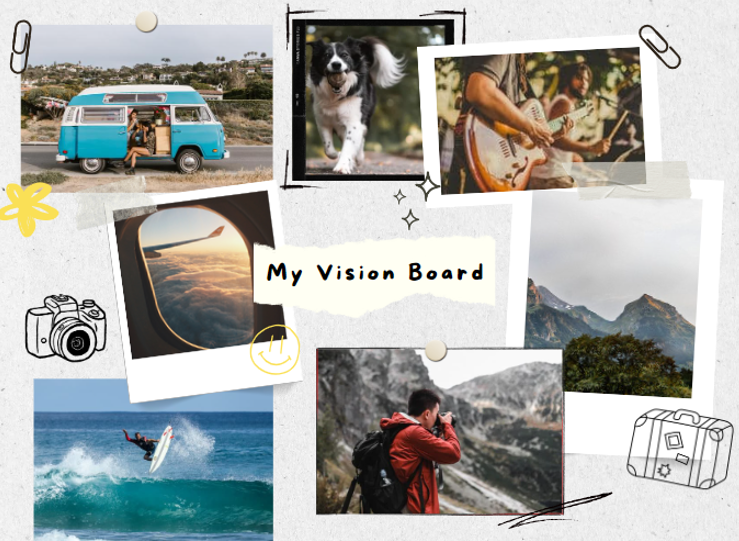
Mindfulness workshops to help students to reflect on their feelings and feel more relaxed
“Mindfulness is a technique you can learn which involves noticing what’s happening in the present moment – taking notice and being aware of your mind, body and surroundings. It’s a good idea to set aside regular time to practice mindfulness, choose a safe space for yourself, take it slowly and don’t worry about whether you’re doing it right.
The way we think and what we think about can affect how we feel and act. That’s why there can be many benefits to practising mindfulness as a tool to improve our wellbeing. Mindfulness aims to help you become more self-aware and kinder towards yourself, feel calmer and less stressed, and choose how to cope and respond to your thoughts and feelings.
We have run various mindfulness workshops at our school’s Wellbeing Hub with different exercises like body scan, mindful meditation and mindful colouring and drawing. Our students have enjoyed having the allocated time to calm down and feel less stressed.
Here’s what some students have said about mindfulness workshops:
- ‘I think that the workshop was helpful in calming me down and making me feel more relaxed as I wasn’t as stressed when I left compared to when I came in.’
- ‘I enjoy the downtime, it takes weight off my shoulders. Doing things seems more manageable.’
- ‘The workshop is good and relaxing. A nice break from school. I learnt different ways to cope/help with my anxiety.’
- ‘I feel that it is a safe place where you can speak your mind and if your stressed out, it can help you to relax and feel more at peace. It is something new to try and help give yourself some downtime.’
One of the mindfulness exercises we have practised with our students has been music appreciation. To create the music appreciation mindfulness exercise, you’ll need to:
- Find a comfortable safe space where you won’t be interrupted
- Choose your favourite music and put on headphones if you find that they help you focus better
- Just tune in, take it slowly and ask yourself:
- How does it feel in my body as I listen?
- What different sounds can I hear that I might not have noticed before?
- How does my breath change with the rhythm of the music?
Another favourite mindfulness activity amongst our students has been pebble painting. This simple yet effective creative outlet brings a lot of joy to our students. They can take a moment to themselves as they focus on painting, notice the thoughts in their minds and create a space between their thoughts and themselves. Pebble painting is a nice activity to help students take a break, chat with friends and practice mindfulness.”
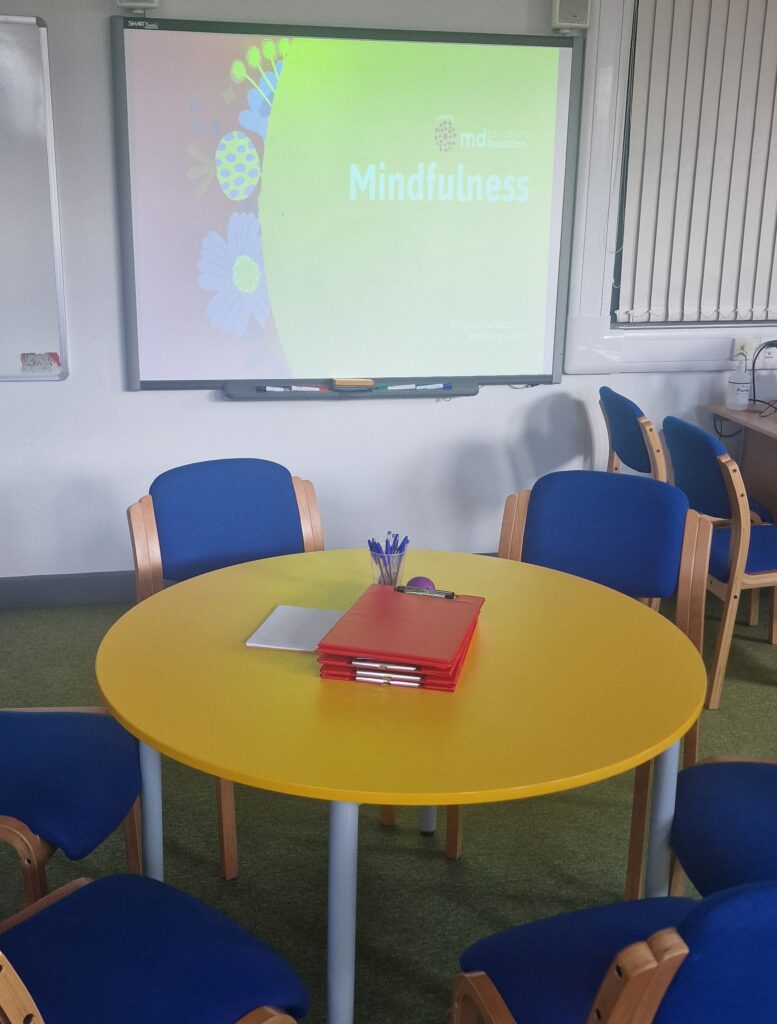
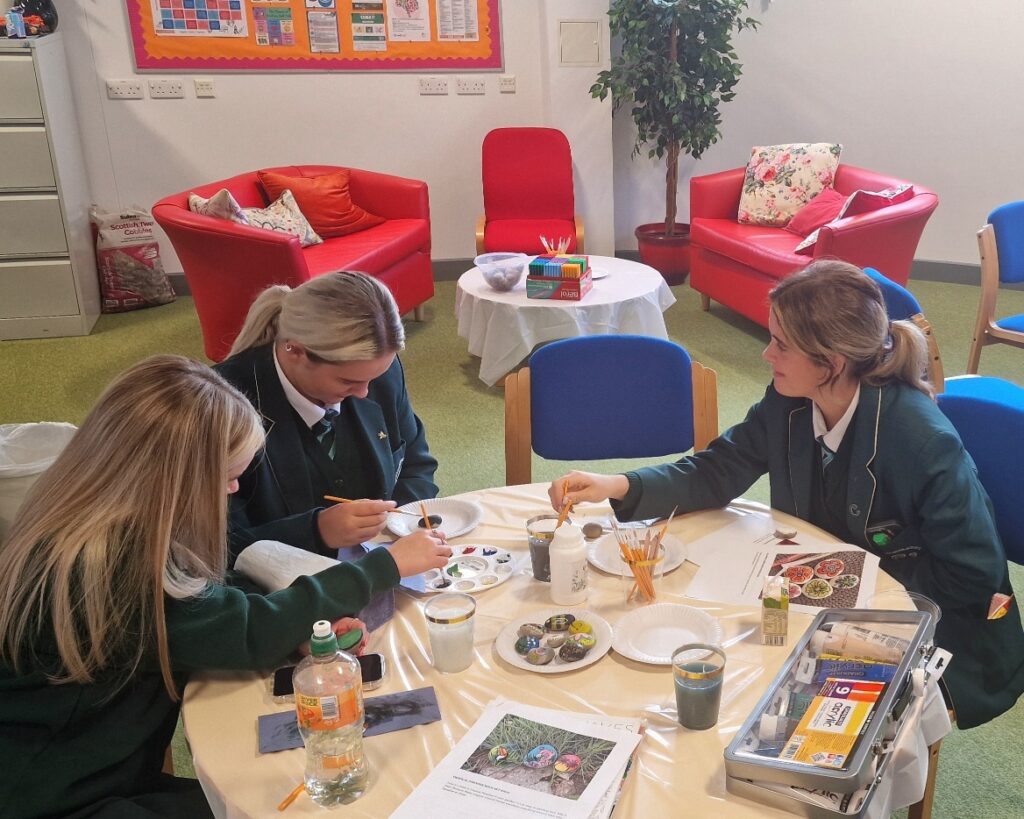
Building student self-esteem through self-care workshop
“Recently at our school, we hosted an engaging workshop that was focused on building self-esteem and confidence. This interactive session was designed to equip students with practical skills to enhance their self-esteem while emphasising the value of self-care.
One student described the workshop by saying ‘the workshop was extremely comforting, knowing that we could chat to our class and everyone listened. I think it gave our class a new perspective on each other and we still had good fun with each other’.
This wellbeing workshop includes four key activities:
Activity 1 – Self-love
The workshop kicked off with small group discussions about self-love and its integration into daily life. Students shared ideas on nurturing self-compassion, which can be especially helpful during times of stress, anxiety, or feeling overwhelmed.
We then explored various aspects of physical wellbeing, such as skincare routines, exercise, and dance, as ways to promote self-care. The group also delved into activities that simplify life, like cleaning, organising, and using planners to create more structure.
Additionally, the participants discussed the joy of treating themselves – whether by buying or crafting meaningful gifts – highlighting the importance of celebrating small wins. Quality time was another significant theme, with activities like spending time alone, engaging in hobbies, pursuing creative outlets like art or reading, and practising meditation.
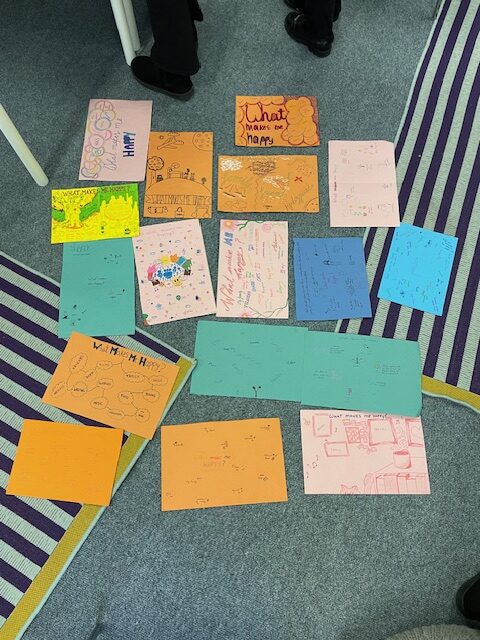
Activity 2 – Positive affirmation activity
The way you talk to yourself matters. Self-talk has a significant impact on your self-esteem, confidence, mental health, and your relationships with others. When your thoughts about yourself are primarily positive, you’re more likely to feel good and approach life with optimism.
With this in mind, students were invited to participate in a positive affirmation activity using a “petal” exercise. Each petal represented an opportunity for self-reflection and appreciation. Students were encouraged to write something they liked about themselves or a skill or quality they were proud of on each petal. By completing the petals with affirmative statements, students created a visual reminder of their strengths and positive traits, fostering self-esteem and a positive mindset.
Activity 3 – What confidence means to me
Students were encouraged to reflect on the concept of confidence in small groups by discussing what it means to them. These intimate discussions provided a safe space for students to share their thoughts and personal experiences, fostering mutual understanding and support.
Afterwards, the groups came together to share their insights with the larger group.
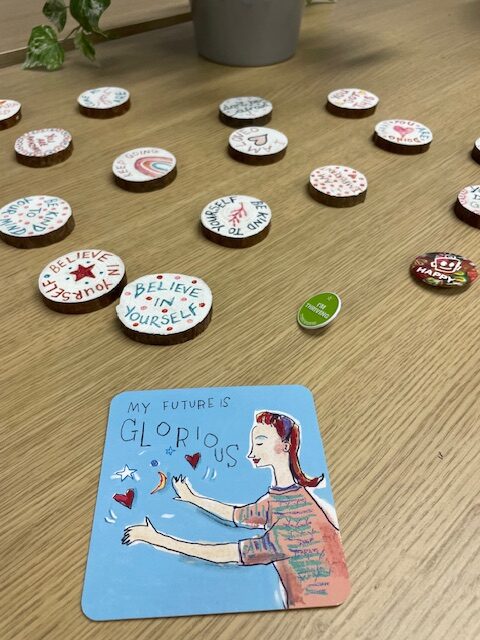
Activity 4 – Self-care: Getting in touch with your senses
This activity is a favourite for both the students and me as the Wellbeing Lead and the facilitator of the exercise.
In our fast-paced lives, we often overlook the power of our senses. By intentionally reconnecting with them, we can enrich our experiences, foster relaxation, boost self-esteem, and find a soothing antidote to life’s challenges.
Students are invited to select from a variety of comforting items, such as soft toys, candles, hand creams, oils, music, or calming images. After making their choice, they share with the group why that particular item resonated with them, creating a reflective and supportive environment.
Here’s what some students have said about this activity:
- ‘You focused your mind and senses on the present moment while exploring the objects during the senses exercise’
- ‘The senses exercise was great, as it allowed me to escape from the sounds and noises around me, as I was focusing on the activity’
- ‘It was great because you could focus on one object and how you connected with it’
Through these activities, the workshop inspired students to prioritise self-care and adopt habits that enhance their self-esteem, confidence, and overall wellbeing, while also fostering connections and learning from their peers.”
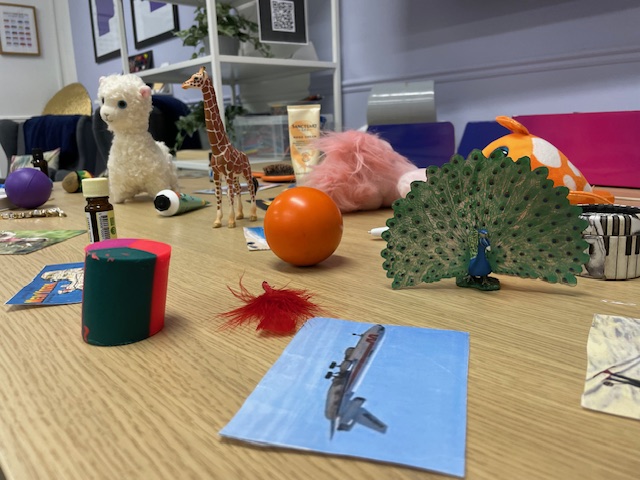
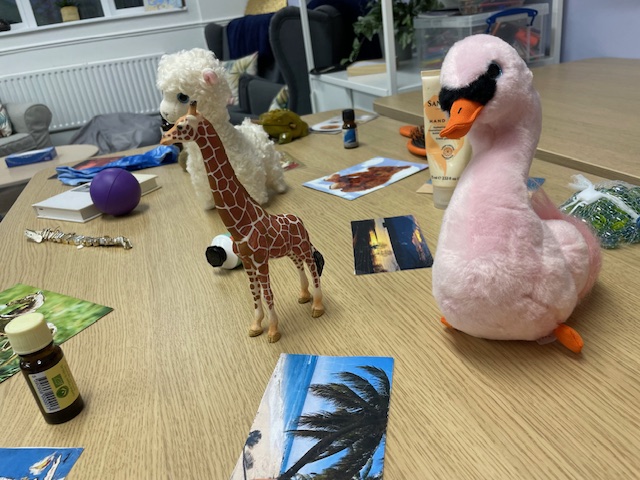
Wellbeing workshops play a crucial part in supporting the mental health of young people
At mdeducational foundation, our mission is for all post-16 students to feel supported in every aspect of their wellbeing, helping them on their journey to a brighter future. Our dedicated Wellbeing Leads are promoting positive wellbeing to students through the delivery of a bespoke wellbeing curriculum targeted specifically to the needs of 16-18-year-olds.
The Wellbeing Leads host different sessions and activities, such as mental health and wellbeing workshops, for their students to encourage young people to open up and normalise talking about wellbeing. Through the various forms of programmes and topics, Wellbeing Leads support students’ wellbeing and mental health by normalising student psychological fitness and resilience through guidance and early intervention.
In a previous blog, we shared a case study from one of our schools as we celebrated our first year collaborating with them. The school community shared their experiences with the wellbeing initiative and the real impact it’s having not just on the students but the school community as a whole. One pivotal part of the wellbeing curriculum has been a variety of different wellbeing workshops their dedicated Wellbeing Lead has hosted. Head to the blog to read more about our significant impact at the school – click here.
In another blog, we shared even more workshop ideas that schools can use to improve student wellbeing and mental health. Head over to find practical wellbeing workshop ideas like the ‘getting to know you’ version of the Jenga game, exercises to develop strategies to understand and manage anxiety and build personalised self-care boxes – more wellbeing workshop ideas here.
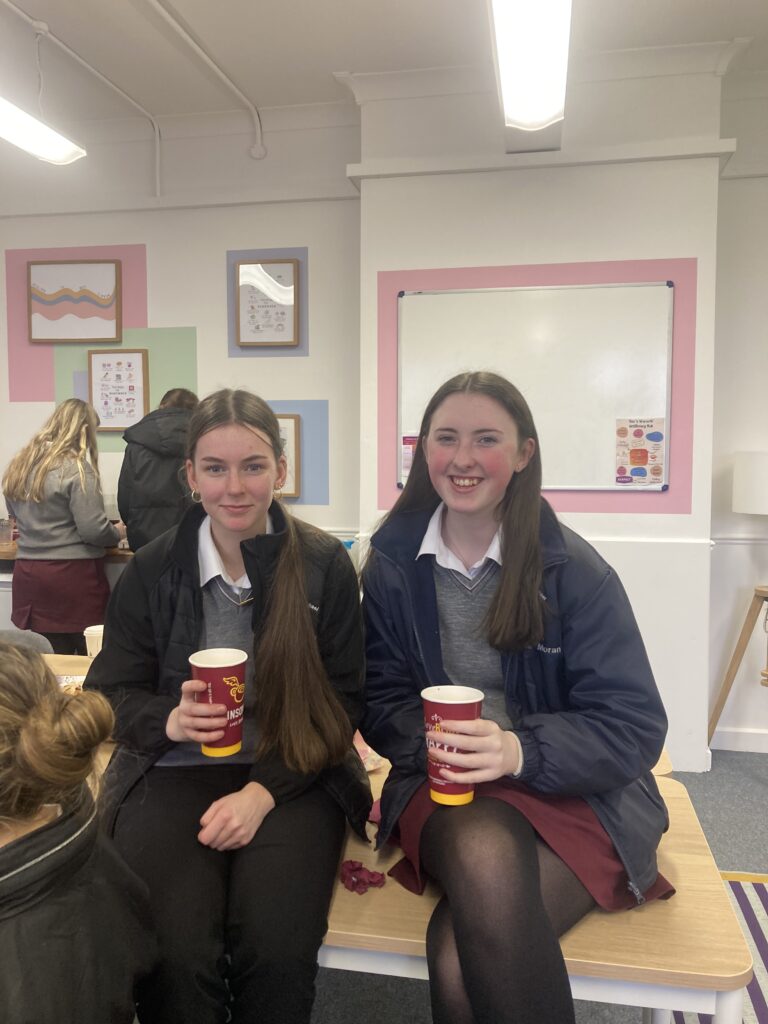
Prioritising student wellbeing through education and beyond
mdeducational foundation is a charity that provides a three-year salary-funded commitment to placing dedicated wellbeing professionals within educational settings, enabling them to kickstart their long-term wellbeing strategies.
Related posts
Championing student wellbeing: Meet James Sweeney, the first mdeducational foundation Ambassador
At mdeducational foundation, we’re committed to prioritising student wellbeing - and now, we’re continuing that mission by inviting members of our community to join us in championing a brighter future for young people. We’re [...]
6 mental health workshops to support and improve the wellbeing of young people in schools
Wellbeing workshops are a great way to promote positive wellbeing, encourage young people to look after their mental health and remove the stigma around mental health and wellbeing. In schools, workshops can provide many [...]
Shining the spotlight on student wellbeing: Meet Susanna Neuvonen, Marketing Executive at mdeducational foundation
At mdeducational foundation, we’re dedicated to prioritising student wellbeing by providing fully funded support in schools and educational settings across the UK and Ireland. Our mission is to ensure that all post-16 students feel supported [...]
